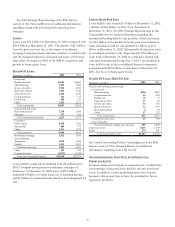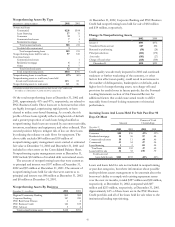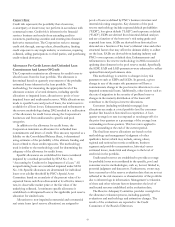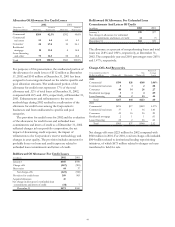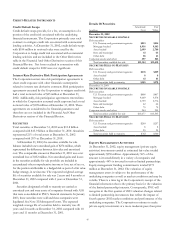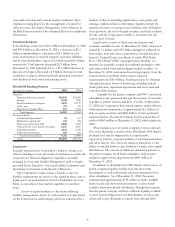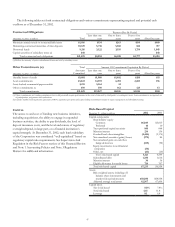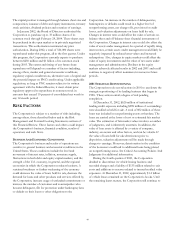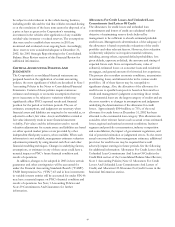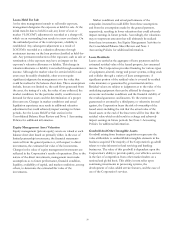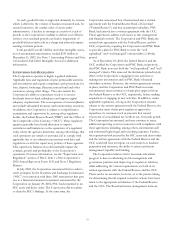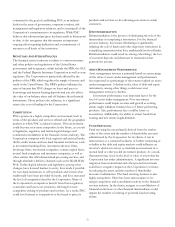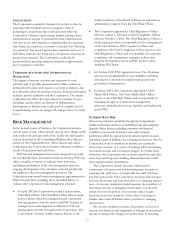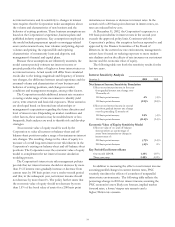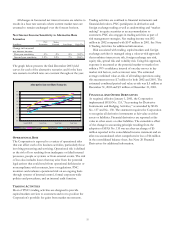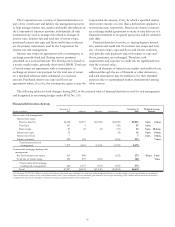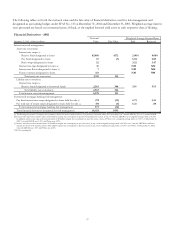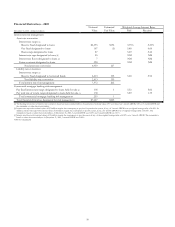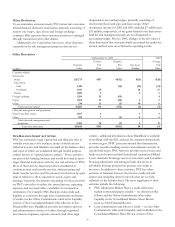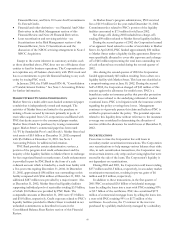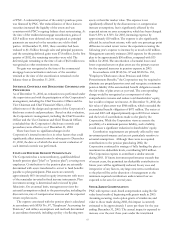PNC Bank 2002 Annual Report Download - page 53
Download and view the complete annual report
Please find page 53 of the 2002 PNC Bank annual report below. You can navigate through the pages in the report by either clicking on the pages listed below, or by using the keyword search tool below to find specific information within the annual report.51
As such, goodwill value is supported ultimately by revenue
which is driven by the volume of business transacted and, for
certain businesses, the market value of assets under
administration. A decline in earnings as a result of a lack of
growth or the Corporation’s inability to deliver cost effective
services over sustained periods can lead to impairment of
goodwill which could result in a charge and adversely impact
earnings in future periods.
Total goodwill was $2.3 billion and other intangible assets,
net of accumulated amortization, totaled $333 million at
December 31, 2002. See Note 1 Accounting Policies and Note
14 Goodwill And Other Intangible Assets for additional
information.
SUPERVISION AND REGULATION
The Corporation operates in highly regulated industries.
Applicable laws and regulations restrict permissible activities
and investments and require compliance with protections for
loan, deposit, brokerage, fiduciary, mutual fund and other
customers, among other things. They also restrict the
Corporation’s ability to repurchase stock or to receive
dividends from its bank subsidiaries and impose capital
adequacy requirements. The consequences of noncompliance
can include substantial monetary and nonmonetary sanctions.
In addition, the Corporation is subject to comprehensive
examination and supervision by, among other regulatory
bodies, the Federal Reserve Board (“FRB”) and the Office of
the Comptroller of the Currency (“OCC”). These regulatory
agencies generally have broad discretion to impose
restrictions and limitations on the operations of a regulated
entity where the agencies determine, among other things, that
such operations are unsafe or unsound, fail to comply with
applicable law or are otherwise inconsistent with laws and
regulations or with the supervisory policies of these agencies.
This supervisory framework could materially impact the
conduct, growth and profitability of the Corporation’s
operations. For more information, see the “Supervision and
Regulation” section of Part I, Item 1 of the Corporation’s
2002 Annual Report on Form 10-K and Note 3 Regulatory
Matters.
In July 2002, the Corporation announced that in order to
settle an inquiry by the Securities and Exchange Commission
(“SEC”) in connection with three 2001 transactions that gave
rise to a financial statement restatement announced by the
Corporation on January 29, 2002, PNC had consented to an
SEC cease and desist order. The Corporation did not admit
or deny the SEC’s findings. At the same time, the
Corporation announced that it had entered into a written
agreement with the Federal Reserve Bank of Cleveland
(“Federal Reserve”) and that its principal subsidiary, PNC
Bank, had entered into a written agreement with the OCC.
These agreements address such issues as risk, management
and financial controls. The Corporation and PNC Bank also
entered into agreements with the Federal Reserve and the
OCC, respectively, requiring the Corporation and PNC Bank
to provide a plan for PNC Bank to meet the “well
capitalized” and “well managed” criteria within a 180-day
period.
As of December 19, 2002, the Federal Reserve and the
OCC notified the Corporation and PNC Bank, respectively,
that PNC Bank now met both the “well capitalized” and “well
managed” criteria. This removed the limitations placed in July
2002 on the Corporation’s engaging in new activities or
making new investments and on PNC Bank’s financial
subsidiary activities. However, the written agreements remain
in place, and the Corporation and PNC Bank in certain
circumstances must continue to obtain prior approval from
the Federal Reserve or the OCC, respectively, before making
acquisitions or engaging in new activities. In addition, under
applicable regulations, as long as the Corporation remains
subject to the written agreement with the Federal Reserve, the
Corporation must obtain prior regulatory approval to
repurchase its common stock in amounts that exceed
10 percent of consolidated net worth in any 12-month period.
The Corporation has incurred, and may continue to incur,
additional operating costs in connection with compliance with
these agreements including, among others, incremental staff
and continued higher legal and consulting expenses. Further,
the reputational risk created by the SEC cease and desist order
and the written agreements with the Federal Reserve and the
OCC could still have an impact on such matters as business
generation and retention, the ability to attract and retain
management, liquidity and funding.
The Corporation believes that it has made substantial
progress to date in enhancing its risk management and
governance practices and improving its regulatory relations,
while addressing the various requirements set forth in its
written agreements with the Federal Reserve and the OCC.
There can be no assurance, however, as to the precise timing
for determining that all required corrective actions have been
taken to the appropriate satisfaction of the Federal Reserve
and the OCC. The Board and senior management team are


